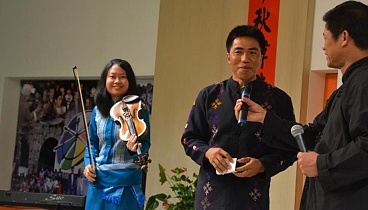 The Spring festival (春節, 春节, chūnjié) or lunar new year (農曆新年, 农历新年, nónglì xīnnián), known in the West as Chinese New Year, is one of the most important and most heartfelt Chinese traditional feast, wherein the new year is celebrated according to the Chinese lunar calendar. The celebrations will start on 16 February and continue for about two weeks up to the Lantern Festival, with numerous activities, shows and markets. On the eve, the families convene for the “dinner gathering,” the most important meal of the year. On this occasion, various generations hang out at round tables to savour food and time together. Every street, house or building is decorated in red, the festival’s main colour. Praying together in a temple during the New Year is believed to be a wish for good fortune for the new year that is about to start. In Shanghai thousands of people crowd in the Longhua Temple, the city’s biggest temple. In Loppiano, the international town of the Focolare where many inhabitants come from the Far East, there will be celebrations for the start of the year of the Dog with a party on Saturday, 17 February, which will be an occasion to delve into the cultures of Asia through games, art, music and dance.
The Spring festival (春節, 春节, chūnjié) or lunar new year (農曆新年, 农历新年, nónglì xīnnián), known in the West as Chinese New Year, is one of the most important and most heartfelt Chinese traditional feast, wherein the new year is celebrated according to the Chinese lunar calendar. The celebrations will start on 16 February and continue for about two weeks up to the Lantern Festival, with numerous activities, shows and markets. On the eve, the families convene for the “dinner gathering,” the most important meal of the year. On this occasion, various generations hang out at round tables to savour food and time together. Every street, house or building is decorated in red, the festival’s main colour. Praying together in a temple during the New Year is believed to be a wish for good fortune for the new year that is about to start. In Shanghai thousands of people crowd in the Longhua Temple, the city’s biggest temple. In Loppiano, the international town of the Focolare where many inhabitants come from the Far East, there will be celebrations for the start of the year of the Dog with a party on Saturday, 17 February, which will be an occasion to delve into the cultures of Asia through games, art, music and dance.
Avoid gossip
Avoid gossip




0 Comments